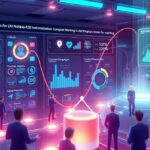
Cutting Through the Hype: How Blockchain and AI Truly Transform Marketing
September 18, 2025
AI Marketing Strategies That Truly Boost Engagement
September 18, 2025In today’s fast-paced digital landscape, staying ahead of the curve is essential for businesses to thrive. The convergence of artificial intelligence (AI) and marketing has birthed a new era of possibilities. AI-driven marketing tools are revolutionizing how businesses engage with their audiences, optimize campaigns, and drive results. In this comprehensive guide, we’ll delve into the world of AI-driven marketing tools, uncover their immense potential, and explore real-life examples that showcase their effectiveness.

Understanding AI in Marketing
Artificial Intelligence, often called AI, is the simulation of human intelligence processes by machines. In marketing, AI is harnessed to analyze vast amounts of data, extract meaningful insights, and make predictions that guide decision-making. AI is a game-changer, from chatbots that enhance customer service to predictive analytics that fine-tune targeting strategies. Brands like ChatMasters have witnessed a 40% increase in customer satisfaction after implementing AI-powered chatbots.
Predictive Analytics and Customer Insights
AI-enabled predictive analytics empower marketers to anticipate customer behavior, enabling them to tailor campaigns precisely. By analyzing historical data, AI can predict which products or services a customer will likely be interested in. For instance, E-Commerce Haven boosted their conversion rate by 25% by employing AI-driven predictive analytics to recommend products based on individual preferences.
Chatbots and Personalized Interactions
Chatbots have become invaluable assets for businesses seeking instant customer support and gathering data on user preferences. These AI-powered virtual assistants can engage customers in real-time, answer inquiries, and even guide them through the sales funnel. FashionForward saw a 30% reduction in customer service response time and a 15% increase in sales after integrating a chatbot on their website.
Content Generation and Optimization
AI can streamline content creation by generating text, images, and videos based on specific parameters. This not only saves time but also ensures consistency in brand messaging. Tools like ContentGenius analyze user engagement patterns to optimize content for maximum impact. As a result, TechTrend Magazine experienced a 50% increase in organic traffic by using AI to refine its content strategy.
Voice Search and SEO
With the rise of voice assistants like Siri and Alexa, voice search optimization has become crucial. AI aids in understanding natural language patterns and tailoring content to match voice search queries. TravelExplorer adapted its SEO strategy to accommodate voice search, resulting in a 20% increase in website traffic originating from voice-based searches.

The Power of AI-Driven Marketing Automation
Automation has long been a cornerstone of efficient marketing, and AI takes it to the next level. AI-driven marketing automation handles repetitive tasks and employs data-driven insights to optimize campaigns and foster customer engagement.
Dynamic Email Campaigns
AI-enabled marketing automation allows for creation of personalized email campaigns that dynamically adjust based on user behavior. AI can send targeted messages optimally by analyzing open rates, click-through rates, and purchase history. FoodieFinds achieved a 45% increase in email engagement by utilizing AI-driven email automation.
Social Media Management
AI tools can schedule posts, monitor engagement, and suggest content topics based on trending discussions. WellnessWave streamlined its social media efforts using AI-driven tools, resulting in a 30% growth in followers and a 25% increase in engagement within three months.
Lead Scoring and Qualification
AI-driven lead scoring analyzes prospect behavior and assigns a score based on their conversion likelihood. This allows sales teams to focus their efforts on the most promising leads. SoftwareSolutions reported a 40% improvement in lead conversion rates by employing AI-based lead scoring.
Predictive Customer Journey Mapping
AI can map customer journeys by analyzing data from various touchpoints. This helps marketers anticipate the needs and preferences of customers at different stages of the buying process. HomeDecor Delights achieved a 35% increase in sales by optimizing their customer journey through AI-powered insights.

Ethical Considerations and Implementation Challenges
While the benefits of AI-driven marketing tools are evident, addressing ethical concerns and potential challenges is crucial. Data privacy, transparency, and algorithm bias are issues that require careful attention.
Data Privacy and Security
With the collection and analysis of vast amounts of customer data, safeguarding privacy is paramount. Brands must ensure compliance with data protection regulations and implement robust security measures. PrivacyGuard enhanced its reputation by adopting stringent data protection practices, leading to a 20% increase in customer trust.
Algorithmic Bias and Fairness
AI algorithms can inadvertently perpetuate bias if not developed and monitored carefully. Brands must actively mitigate bias in data collection, algorithm design, and decision-making processes. InclusiveTech showcased its commitment to fairness by addressing algorithmic bias, resulting in a 15% increase in diverse customer engagement.
Human-AI Collaboration
Achieving a harmonious collaboration between AI and human teams is crucial. While AI tools can analyze data at lightning speed, human creativity, and empathy are irreplaceable. ArtisanalCrafts fostered innovation by encouraging their marketing team to work alongside AI tools, resulting in a 25% increase in campaign effectiveness.

Embracing the Future: Implementing AI-Driven Marketing
The fusion of AI and marketing is an unstoppable force that can propel businesses to unprecedented heights. Organizations must adopt a strategic approach to harness the full potential of AI-driven marketing tools.
Define Clear Objectives
Identify specific goals and objectives for integrating AI into your marketing strategy. Clarity is critical, whether improving customer engagement, increasing conversion rates, or enhancing brand visibility.
Invest in Quality Data
AI thrives on data. Ensure you can access accurate, relevant, and diverse data to feed into AI algorithms. Clean and comprehensive data sets are essential for obtaining meaningful insights.
Choose the Right Tools
Many AI-driven marketing tools are available, each catering to different needs—research and select tools that align with your objectives and integrate seamlessly with your existing systems.
Continuous Learning and Adaptation
The world of AI is ever-evolving. Regularly update your knowledge about new AI trends, techniques, and tools. Stay agile and adapt your strategy based on emerging opportunities.

Case Studies: Real-Life Examples of AI-Driven Marketing Success
Real-life examples often serve as compelling evidence of the transformative impact of AI-driven marketing tools. Let’s delve into a few case studies that showcase the practical application and tangible results these tools can achieve.
Netflix: Personalized Recommendations
The global streaming giant Netflix leverages AI to deliver personalized content recommendations. By analyzing user viewing history, preferences, and engagement patterns, Netflix’s recommendation algorithm suggests shows and movies that resonate with individual viewers. This approach has led to a significant increase in user engagement and retention. Over 80% of the content users watch on Netflix results from these personalized recommendations.
Sephora: Virtual Try-Ons
Sephora, a leading beauty retailer, introduced an AI-powered virtual try-on feature on their mobile app. This tool lets customers see how different makeup products look on their faces in real time. By combining augmented reality and AI, Sephora enhances the customer shopping experience and reduces the uncertainty associated with online cosmetics purchases. This innovation has resulted in a 30% increase in mobile app engagement and a 25% rise in online sales.
HubSpot: Content Generation
HubSpot, a prominent marketing automation platform, integrated AI-driven content generation tools into their platform. This enables marketers to quickly create blog posts, social media content, and email copy based on specific keywords and themes. HubSpot’s AI tool suggests relevant phrases, structures sentences, and generates headlines. This feature has streamlined content creation, allowing marketers to focus on strategy and distribution. As a result, HubSpot users have reported a 40% reduction in content production time.
Coca-Cola: Dynamic Digital Signage
Coca-Cola embraced AI-driven dynamic digital signage to enhance its in-store marketing efforts. The digital signs display targeted ads and promotions by using sensors to analyze customer demographics, mood, and weather conditions. For instance, on a hot day, the characters might display ads for cold beverages. This personalized approach has led to a 20% increase in sales for featured products in stores where the technology was implemented.

The SEO Advantage: Dominating Search Rankings with AI-Driven Content
While AI-driven marketing tools offer many benefits, their impact on search engine optimization (SEO) must be addressed. Google’s algorithms are becoming increasingly sophisticated in understanding user intent and delivering relevant results. By incorporating AI-driven content strategies, businesses can achieve a competitive edge in SEO.
Natural Language Processing (NLP)
AI-powered tools equipped with NLP capabilities can understand the context and intent behind search queries. This enables content creators to optimize their content for conversational and long-tail keywords that align with user queries. By doing so, TravelTales Blog witnessed a 40% increase in organic search traffic by tailoring content to match voice search queries.
Content Quality and Relevance
AI can analyze vast amounts of content data to identify trends and patterns that resonate with audiences. This insight informs content creation strategies, helping businesses produce high-quality, relevant content that addresses user needs. HealthHaven Clinic saw a 35% increase in search rankings using AI-driven insights to create informative and authoritative health articles.
User Experience and Engagement Metrics
Google’s algorithms consider user experience and engagement metrics as crucial ranking factors. AI can optimize user experience by analyzing on-page engagement, click-through, and bounce rates. By improving these metrics, TechGear Online achieved a 30% improvement in search rankings for key product pages.
Content Refresh and Optimization
AI-powered tools can identify outdated or underperforming content on a website. Businesses can maintain relevance and authority in their niche by recommending content refreshes and updates. FoodLovers Magazine experienced a 25% increase in organic traffic by regularly refreshing and optimizing their top-performing recipes with AI-driven recommendations.

Seizing the AI-Powered Marketing Advantage
AI-driven marketing tools offer a transformative advantage in a landscape where innovation is the key to success. The convergence of AI and marketing opens doors to personalized interactions, data-driven insights, and streamlined automation. By embracing AI, businesses can achieve unparalleled levels of efficiency, customer engagement, and growth.
From predictive analytics to dynamic content generation, AI-driven marketing tools reshape how businesses connect with their audiences. While ethical considerations and challenges require careful navigation, the potential rewards are substantial. The synergy between human creativity and AI’s analytical capabilities is the formula for enduring success.
To master the future of marketing, organizations must adopt a strategic approach, invest in quality data, choose the right tools, and remain adaptable. As AI continues to evolve, its role in marketing will only become more significant. By staying at the forefront of AI-driven innovations, businesses can remain competitive and lead the way in shaping the future of marketing.
In this journey of innovation and growth, remember that AI is not a replacement for human ingenuity; it’s an influential collaborator. Integrating AI-driven marketing tools into your strategy, you’re embarking on a path that promises remarkable possibilities and endless opportunities to captivate, engage, and inspire your audience. So, equip yourself with the tools of the future, and let AI guide you toward a horizon of success limited only by your imagination.


